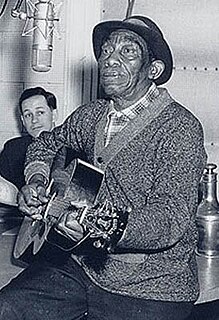
John Smith Hurt, better known as Mississippi John Hurt, was an American country blues singer and guitarist.

Booker T. Washington "Bukka" White was an American Delta blues guitarist and singer. Bukka is a phonetic spelling of White's first name; he was named after the African-American educator and civil rights activist Booker T. Washington.

Matthew Stephen Ward is an American singer-songwriter and guitarist from Portland, Oregon. Ward's solo work is a mixture of folk and blues-inspired Americana analog recordings; he has released ten studio albums since 1999, primarily through independent label Merge Records. In addition to his solo work, he is a member of indie pop duo She & Him and folk-rock supergroup Monsters of Folk, and also participates in recording, producing, and playing with multiple other artists.

The Transfiguration of Blind Joe Death is a 1965 album by American fingerstyle guitarist and composer John Fahey. Originally issued in a hand-lettered edition of 50, it was Fahey's first album to be released by a label other than his own Takoma Records. As with all of Fahey's independently released early albums, it had little critical recognition upon release. The album has grown in stature since its reissue on CD in 1997 and is now highly regarded critically. It was Fahey's fourth album to see release, though after his fifth album, The Great San Bernardino Birthday Party & Other Excursions, was labeled Guitar Vol. 4, reissues of The Transfiguration of Blind Joe Death were subtitled John Fahey, Volume 5.

Aliens vs. Predator: Requiem is a 2007 American science fiction action film directed by the Brothers Strause in their directorial debut and written by Shane Salerno. The film stars Steven Pasquale, Reiko Aylesworth, John Ortiz, Johnny Lewis and Ariel Gade.

John Aloysius Fahey was an American fingerstyle guitarist and composer who played the steel-string acoustic guitar as a solo instrument. His style has been enormously influential and has been described as the foundation of the genre of American primitive guitar, a term borrowed from painting and referring mainly to the self-taught nature of the music and its minimalist style. Fahey borrowed from the folk and blues traditions in American roots music, having compiled many forgotten early recordings in these genres. He would later incorporate 20th-century classical, Portuguese, Brazilian, and Indian influences into his work.

Between Five and Seven is as the name suggests, the sixth studio album by folk singer-songwriter John Gorka. It was released in August 1996. It is the last of the five albums Gorka recorded for Windham Hill/High Street Records before returning to the smaller, Red House label. Gorka produced the album with John Jennings who also produced Gorka's previous record, Out of the Valley. Unlike the previous record made in Nashville, Tennessee, the recording was done at Paisley Park Studios, Chanhassen, Minnesota and the instrumentation has been described as "more acoustic, less pop-oriented." Paisley Park is southwest of Minneapolis and is the studio designed and owned by the artist, Prince.

The Voice of the Turtle is the seventh album by American guitarist John Fahey. Recorded and released in 1968, it is considered one of his more experimental albums, combining not only folk elements, but shreds of psychedelia, early blues, country fiddles, ragas, and white noise. The album had many reissues with various track listings, jacket designs and mismatched titles.

The Yellow Princess is the ninth album by American folk musician John Fahey. Released in 1968, it was his second and last release on the Vanguard label.
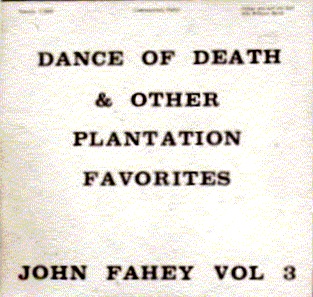
The Dance of Death & Other Plantation Favorites is the third album by American fingerstyle guitarist and composer John Fahey, released in 1965. The 1999 reissue contained four previously unreleased tracks.

Fare Forward Voyagers is an album by American fingerstyle guitarist and composer John Fahey, released in 1973. It contains three songs, one comprising a complete side of the original LP.
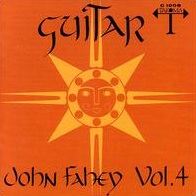
The Great San Bernardino Birthday Party & Other Excursions is an album by American fingerstyle guitarist and composer John Fahey, released in 1966. The cover simply labels the album Guitar Vol. 4 while the liner notes label it The Great San Bernardino Birthday Party & Other Excursions. The title never appeared on the record labels themselves. It marked the beginning of Fahey's interest in his recording of experimental soundscapes and sound effects. Despite Fahey's distaste for the 1960s counterculture, it is his release most often referred to as psychedelic.

Requia is the eighth album by American fingerstyle guitarist and composer John Fahey. Released in November 1967, it was the first of Fahey's two releases on the Vanguard label.
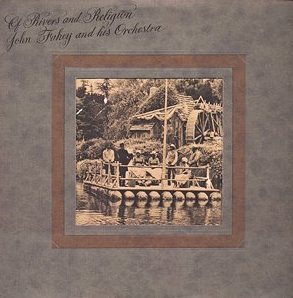
Of Rivers and Religion is an album by American folk musician John Fahey, released in 1972. It was his first recording on a major label and is credited to John Fahey and His Orchestra. It marked a significant change from Fahey's previous releases, incorporating a backing band and performing songs and arrangements in a Dixieland jazz style. Although Time picked it as one of the Top Ten albums of 1972, it was also a difficult album to market and had little enthusiasm at Reprise.

God, Time and Causality is an album by American fingerstyle guitarist and composer John Fahey, released in 1989.
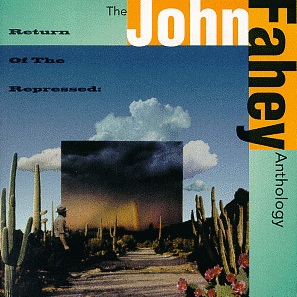
The Return of the Repressed: The John Fahey Anthology is a compilation album by American fingerstyle guitarist and composer John Fahey, released in 1994. Fahey's career, health and personal life had been in decline. The release of The Return of the Repressed, along with an article in Spin magazine by Byron Coley served to provide a renewal of his career.

The Great Santa Barbara Oil Slick is a live album by American fingerstyle guitarist and composer John Fahey, released posthumously in 2004.

The Best of the Vanguard Years is a compilation album by American fingerstyle guitarist and composer John Fahey, released in 1999.
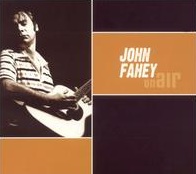
On Air is a live album by American fingerstyle guitarist and composer John Fahey, released posthumously in 2005.

Vanguard Visionaries is the title of a compilation recording by American fingerstyle guitarist and composer John Fahey, released in 2007.




















